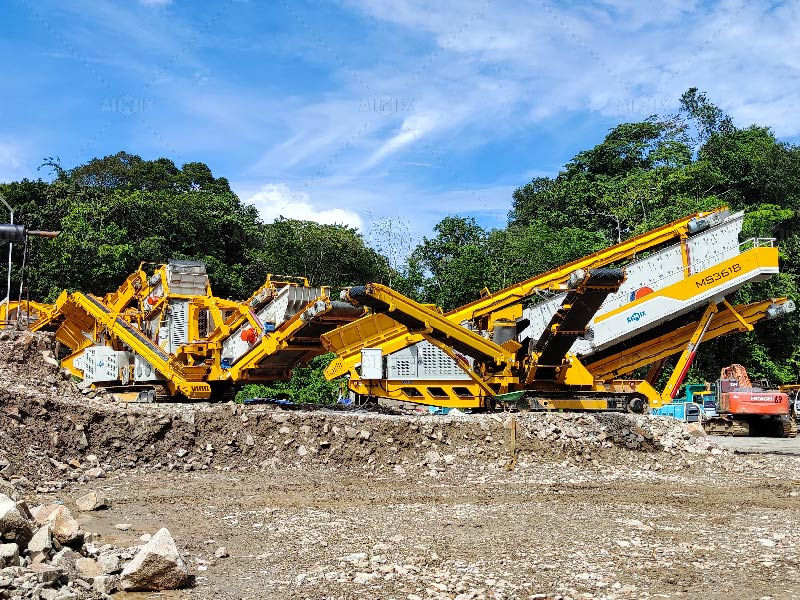Is a Mobile Aggregate Plant a Viable Option?
- info515452
- 3月12日
- 讀畢需時 3 分鐘
In the mining and construction industries, the demand for flexible and cost-effective aggregate production is increasing. Traditional stationary plants have long been the standard, but mobile aggregate plants offer unique advantages in terms of mobility, efficiency, and adaptability. These plants integrate key equipment, such as an aggregate crusher plant, to process raw materials on-site, reducing transportation costs and improving productivity. With advancements in technology, mobile solutions—especially those featuring a jaw crusher or a crawler type stone crusher—are becoming more viable for a wide range of applications.
Advantages of a Mobile Aggregate Plant
1. Increased Flexibility and Mobility
One of the biggest benefits of a mobile aggregate plant(planta de trituración de agregados) is its ability to move from site to site. Unlike stationary setups, mobile units can be transported to different locations, making them ideal for projects in remote areas. This flexibility is especially valuable in:
Temporary construction sites
Road and bridge projects
Mining operations in changing locations
By eliminating the need for fixed installations, mobile aggregate plants offer a more adaptable solution for evolving production needs.

2. Reduced Transportation Costs
Transporting raw materials to a stationary aggregate crusher plant can be costly and time-consuming. Mobile plants allow on-site crushing, reducing the need for hauling large quantities of rock over long distances. This not only saves fuel costs but also minimizes wear on transportation equipment. Key cost benefits include:
Lower fuel consumption for trucks
Reduced labor costs for material handling
Less reliance on external suppliers for aggregate supply
By processing materials closer to the construction site, companies can improve overall project efficiency.
3. Efficient On-Site Crushing and Screening
Mobile aggregate plants are equipped with various crushers to process raw materials efficiently. A jaw crusher(trituradora de mandíbula) is often used for primary crushing, breaking down large rocks into smaller, manageable sizes. Additional crushing stages can be added depending on the project’s requirements. Mobile units typically include:
Jaw crushers for coarse material reduction
Cone or impact crushers for secondary processing
Vibrating screens for sorting aggregate sizes
This setup ensures that aggregates meet the required specifications before being used in construction applications.
4. Versatility with Different Crushing Equipment
A mobile aggregate plant can integrate different types of crushers to suit specific project needs. A crawler type stone crusher(trituradora de piedra de oruga) is particularly effective for rough terrains, offering enhanced mobility and stability. Compared to wheeled crushers, crawler-type models are better suited for:
Uneven ground and mining areas
Locations with limited infrastructure
Demanding applications requiring heavy-duty crushing
This adaptability makes mobile plants a viable choice for contractors working in challenging environments.
Challenges of a Mobile Aggregate Plant
1. Higher Initial Investment
While mobile plants offer long-term savings, they require a higher initial investment than some stationary units. Costs include:
Purchasing or leasing mobile equipment
Transporting and setting up the plant
Additional maintenance for moving parts
Companies must evaluate their long-term production needs before committing to a mobile solution.
2. Regular Maintenance and Wear
Since mobile plants operate in various environments, they experience more wear and tear than stationary setups. Regular maintenance is necessary to ensure peak performance. Key maintenance tasks include:
Inspecting the jaw crusher for component wear
Checking conveyor belts for proper alignment
Lubricating moving parts to prevent breakdowns
A well-maintained mobile plant can still achieve high efficiency despite operating under tough conditions.
3. Limited Production Capacity Compared to Stationary Plants
For large-scale aggregate production, stationary plants often provide higher output levels. While mobile units can handle significant volumes, they may not be the best option for high-capacity processing. However, for medium-scale projects and temporary jobs, they remain a practical solution.
Is a Mobile Aggregate Plant Right for Your Project?
A mobile aggregate plant is a viable option for businesses that prioritize flexibility, on-site efficiency, and cost reduction. If your project involves frequently changing locations, a crawler type stone crusher or a mobile aggregate crusher plant can provide the adaptability needed to maximize productivity. However, for long-term, high-capacity production, stationary plants may still be the preferred choice. By evaluating project requirements and operational goals, companies can determine whether a mobile solution is the best fit for their aggregate processing needs.






留言